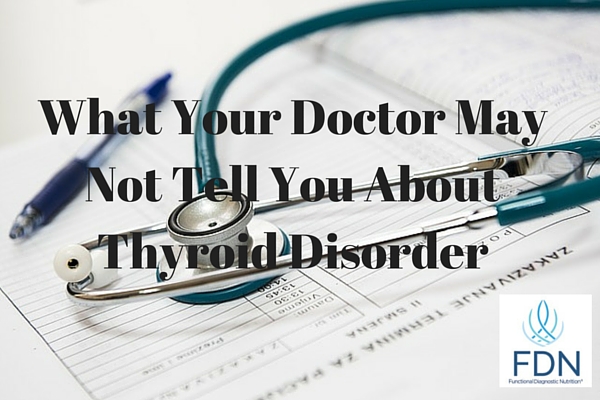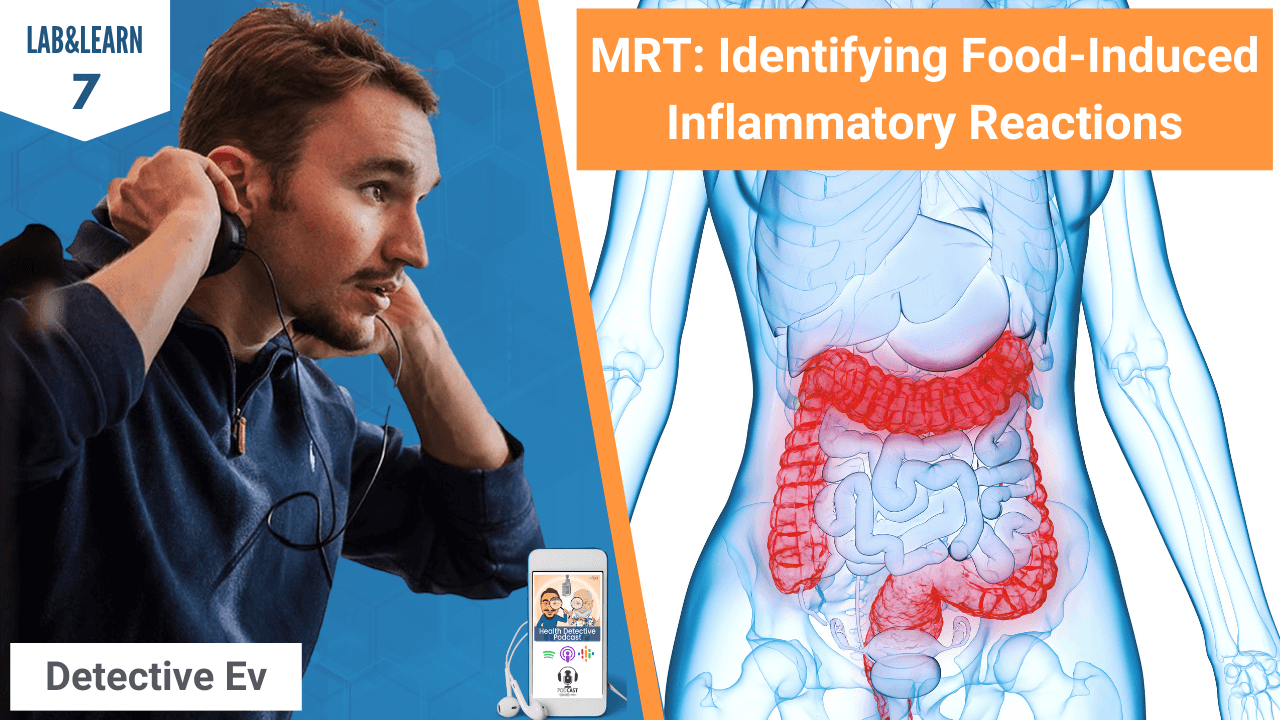Weight gain, cold hands and feet, low energy and fatigue, dry skin, brain fog, poor memory, depression, hair loss, and digestive issues are all classic symptoms of low thyroid output. How can it be that so many people with these very symptoms show no clinical signs of a thyroid disorder? Their lab results fall into normal reference ranges, and no visible tumors or abnormalities are present on their thyroid gland. Some might receive medications to address their specific symptoms such as antidepressants or other medications, while others may simply be sent on their way with an the assurance that “everything looks fine,” or worse, the diagnosis that they are “simply getting older.”
Don’t Always Blame the Thyroid
The truth is, the “classic thyroid symptoms” mentioned above might not be caused by the thyroid at all. These symptoms can be the result of an imbalance in the gut, the liver, the brain, the adrenal glands, even the individual cells of your body – or any combination of those. We really should not be so quick to blame one gland, organ, or system. Western medical doctors are trained to diagnose, treat, prescribe, and operate on specific and isolated issues, and they are very good at doing that – when needed. But what our body’s other needs? That’s the stuff your doctor may not be telling you about.
It is common practice in the clinical care model to treat symptoms and test results and to focus on one specific part of the body at a time. In Functional Diagnostic Nutrition® (FDN), we do not treat symptoms or test results. FDN practitioners do not diagnose or treat any specific condition, but rather, address the person as a whole. FDN practitioners seek out healing opportunities by uncovering imbalances and dysfunction – not just in the thyroid, but also in areas such as endocrine, immune, digestion, detoxification, and neurotransmitters. We focus on what the body really needs in order to build health.
FDNs are holistic practitioners that work at a subclinical (pre-disease) level and understand that the body is a dynamic and complex composition of interrelated systems, each of which must be addressed when seeking to restore optimum health, and in this case, thyroid production and usage.
Primary vs Secondary Thyroid
It is important to understand there are primary thyroid conditions and secondary thyroid conditions. A primary thyroid condition is when the thyroid gland, itself, is dysfunctional and not producing at optimum levels. Cysts and tumors are also examples of primary thyroid. Medical doctors are good at identifying and addressing these needs. In some cases, medical supervision may be required indefinitely. FDN perfectly complements such clinical care by reducing chronic stress and inflammation and restoring balance in the supportive systems of the body. Focusing on these needs can significantly improve a patient’s responsiveness to medications and aid in the dissolution of symptoms such as weight gain, digestive issues, fatigue, and depression.
This can be done alongside medical treatment through a holistic grounding program of diet, rest, exercise, stress reduction and supplementation, known as D.R.E.S.S for Health® Success Self-Care program, which your FDN practitioner will guide and coach you through.
A secondary thyroid condition is where the thyroid, itself, is functioning normally, but dysfunction is present in other areas of the body due to chronic stress, inflammation, congestion, or toxicity. This can result in less-than-optimal amounts of thyroid hormone being produced or available to the cells, and symptoms can present identically to an improperly functioning thyroid. If you have a secondary thyroid condition, a prescription for thyroid replacement hormone will not address the underlying issues and, therefore, not improve your health. An FDN health detective can systematically uncover the layers of dysfunction and, where possible, identify the true sources of your condition and symptoms.
Let’s take a closer look at the thyroid glands, thyroid hormones, and some possible causes of secondary thyroid conditions.
The Thyroid – Master Metabolic Hormone
The thyroid gland is a butterfly-shaped organ located in the neck. It produces most of the body’s thyroid hormone. There are two main hormones produced by the thyroid: T4 (thyroxine), which makes up the majority, and thyroid T3 (triiodothyronine), which is produced in smaller amounts. Every cell in the body has receptor sites for thyroid hormone. Thyroid hormone is really the master metabolic hormone and affects every type of cell we have. Thyroid hormone helps regulate metabolism and energy production in the cells and, therefore, tissue growth and repair, cardiac rate, bone density, cholesterol levels, body heat and, among many other things, energy levels.
A Little Help From its Friends: the Brain, Adrenals, Liver and Gut
The thyroid works at the behest of the hypothalamus and the pituitary glands in the brain. Together, the three organs comprise the “HPT axis”. When the hypothalamus detects that thyroid hormone in the body is low, it secretes TRH (thyrotropin releasing hormone), a message to the pituitary gland to secrete TSH (thyroid stimulating hormone). The TSH stimulates the thyroid to release more thyroid hormones into the bloodstream and bring levels up to “normal.”
The effects of stress, inflammation and other hormones on the HPT axis can result in problems producing the correct amount of TSH and seriously affect thyroid output. This is why a holistic approach and health detective work is essential when dealing with common thyroid symptoms.
The Adrenals – Stress Busters
The adrenal glands sit on top of your kidneys and produce hormones such as cortisol (which helps to regulate blood sugar) and aldosterone (which helps control blood mineral levels) and adrenaline (which helps your body react to stress). The adrenal glands, much like the thyroid, get their messages and directives from the hypothalamus and pituitary.
The adrenal glands were designed to handle acute stress situations without much of a problem. In today’s world, our bodies are under constant attack from various stressors – whether it be mental/emotional stress (work, relationships, finances), physical stress (injuries, infections, surgery), or environmental stress (toxins, food sensitivities, pollution). This constant, chronic stress has a negative effect on adrenal function.
When the adrenal glands are over-stressed, they release a large amount of cortisol, putting the body into a catabolic state. This means that the body is breaking down. As a protective mechanism, the thyroid gland slows down metabolism in order to conserve resources. This is why the thyroid glands often do not respond to treatment when dysfunction of the adrenal glands is not also addressed. Adrenal dysfunction can lead to other issues including a compromised immune system which, when combined with a thyroid disorder, may eventually result in an autoimmune thyroid disorder, such as Hashimoto’s Thyroiditis.
As you can see, our body is incredibly adaptive and self-regulatory up to a point. We are designed to maintain balance and homeostasis. All of our systems work together in an attempt to maintain this balance. However, chronic stress can create imbalances in one area of the body that can easily spill over to other areas.
This is why a holistic approach is essential, and the health detective work of an FDN health coach is so valuable.
The Liver – Conversion, Binding, and Detoxification
Believe it or not, the liver is a major player in maintaining the optimum levels of usable thyroid hormone. A healthy thyroid produces two types of thyroid hormone, T4 and T3. It produces T4 in larger amounts than the T3, yet T3 is the ONLY form of thyroid hormone that the cells can use. T4 must be converted to T3 before it can be used by the cells. Guess where that conversion takes place? That’s right! In the liver!
It’s a pretty simple process. T4 is made up of one molecule of tyrosine (a protein) and four molecules of iodine. In the conversion of T4 to T3, one molecule of iodine is taken away. The newly formed T3 is then set out into the bloodstream to have its effect on every cell in the body. If this conversion doesn’t happen properly, the shortage of usable thyroid hormone will result in poor metabolism and a variety of symptoms. (Remember, thyroid hormone is the essential “fuel” that allows every cell in your body to do its job efficiently.)
The second function of the liver as it relates to thyroid hormone is binding. The liver produces a substance called thyroid binding globulin that “binds” up the thyroid hormone preventing it from being absorbed into the cells immediately surrounding the thyroid gland. It basically puts the thyroid hormone in safe storage for transport to other areas. If the liver produces too much of this binding globulin, then there will not be enough free T3 circulating, and thyroid hormone levels will appear low. Conversely, if too little is created, then too much free T3 will be circulating, making thyroid levels appear high.
Why is too much T3 not a good thing? If the cells are bombarded with too much T3 at too fast a pace, the thyroid hormone receptor sites in each cell become resistant rather than receptive to T3, starving the cell of its much needed thyroid hormone. Our miraculous body has regulatory safeguards built in to prevent this resistance from happening. One of these safeguards is the production of the binding globulin in the liver.
Another safeguard also takes place in the liver. This is the production of RT3, or reverse T3. Just like it sounds, it is essentially the opposite of T3, specifically designed to balance out levels of T3 in the body.
Liver congestion or dysfunction can lead you to believe that you have a thyroid condition. However, a thyroid blood test may show that your thyroid is producing the correct amount of hormones, and your medical doctor might tell you “everything looks normal.” This must be translated as “everything on the thyroid hormone test” looks normal. Further investigation is needed.
A good health detective looks at the entire body – including the liver.
What About the Gut?
The gut is also exceptionally important for thyroid hormone levels. In fact, 20% of our useable T3 is produced in our gut. Like active T3, T3S (sulfate) and T3AC (acetic acid) forms are also made in the liver from T4. These forms must be converted into active T3 by friendly flora (the good bacteria) in the gut. This represents a whopping one-fifth of our overall active thyroid hormone!
The human body hosts billions of bacteria. In fact, we house more bacteria than we have cells in our own bodies. Some of these bacteria are beneficial, helping to nourish us, break down proteins, and convert inactive T3S and T3AC into active T3.
Meanwhile, the “bad” or unhelpful bacteria produces toxins that our livers must be able to process and excrete for elimination. Too many toxins can contribute to a congested liver, and too much bad bacteria vs. good bacteria can result in an imbalance or a condition called dysbiosis. Dysbiosis can be a result of stressors such as poor diet, inflammation, overuse of antibiotics, and exposure to chemical toxins, food sensitivities, or pathogen infestations. If conditions continue to exist, our gut can become leaky and allow unwanted particles and toxins to pass through the mucosal barrier. This puts the immune system on red alert and causes inflammation.
Dysbiosis and leaky gut can lead to a decrease in active T3 levels. In addition, poorly functioning guts do not assimilate food well, causing deficiencies in the very vitamins and minerals essential for thyroid hormone production including vitamin A, vitamin D, selenium, and zinc.
So, clearly, decreased thyroid hormone production and activation are directly influenced by gut malfunction.
What Can I Do?
Alleviating symptoms of a secondary thyroid condition requires identification and handling of the stressors and dysfunctions and improving our body’s ability to produce, bind, convert, and use thyroid hormone. This requires a holistic approach that supports and nourishes the cells, tissues, systems, and organs that play a role in thyroid hormone production and usage.
Some things that you can focus on include:
-
Test – Don’t Guess
If you are not feeling your best and are suffering from some of the classic thyroid symptoms mentioned earlier, do what we do. Test, don’t guess. Adrenal function, liver congestion and dysfunction, and gut health are all addressed by the flagship tests that every FDN has in their toolkit.- The BioHealth 205 – Adrenal Stress Profile
- The BioHealth 101 – Metabolic Assessment (Digestion, Anti/Pro-oxidant balance and Liver Congestion)
- The BioHealth 304 – Intestinal Barrier Function Test
- Eat Nutrient Dense Foods That Heal, Support Your Liver and Feed Your Brain
- Bone marrow, bone broth, and nourishing foods like liver.
- Wild-caught fish, pastured pork, natural eggs, organ meats, and grass-fed beef.
- Fermented goodies like kimchi, sauerkraut, kefir, kombucha and miso.
- Healthy fats like coconut oil and avocados.
- Lots of very dark vegetables and fruits.
- Eat Foods That Contain Vital Thyroid Supporting Nutrients
- Seaweed, nori, and kelp for iodine.
- Brazil nuts, oysters, or shellfish for selenium.
- Coconut oil and the meat of fresh aloe plants for gut thyroid conversion
- Sleep
- Go to sleep by 10 pm.
- Get at least 7 hours of sleep each night
- Sleep in a dark, cool space
- Avoid computer screens, television, and harsh lighting 2 hours before bed
- Stress Reduction
- Eliminate known stressors
- Do a liver/gallbladder cleanse
- Eliminate processed foods, gluten, dairy, and sugar
- Do yoga, meditate, and practice deep breathing
- Supplementation
A skilled FDN practitioner can assist you in supporting the body with supplements that may include one or more of the following: glandular thyroid support, adrenal support, digestive support, and/or a variety of vitamins and minerals.
When you understand the importance of adopting a holistic approach to all health concerns, it opens the door to solving those stubborn health issues that might otherwise go unresolved. You do not have to live with pain and discomfort. Healing opportunities are there if you look for them, and a holistically grounded self-care program has been created to help you achieve your optimum health, vitality, and longevity.







